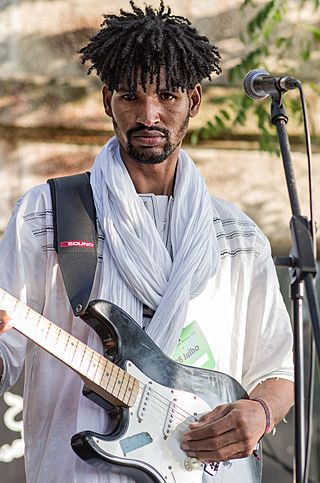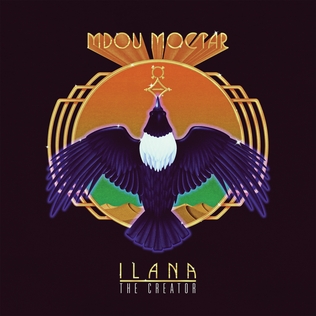
The music of Niger has developed from the musical traditions of a mix of ethnic groups; Hausa, the Zarma-Songhai, Tuareg, Fula, Kanuri, Toubou, Diffa Arabs and Gurma and the Boudouma from Lac Chad.

Agadez, formerly spelled Agadès, is the fifth largest city in Niger, with a population of 110,497 based on the 2012 census. The capital of the eponymous Agadez Region, the city lies in the Sahara desert, and is also the capital of Aïr, one of the traditional Tuareg–Berber federations. The historic centre of the town has been designated a World Heritage Site by UNESCO.

Rick White is a Canadian musician and singer-songwriter. Born in Moncton, New Brunswick, he was a member of indie bands Eric's Trip, Elevator, Perplexus, and The Unintended. White first played music, in a band called "Bloodstain", in 1984, before starting his own band "in 1986", called "T.C.I.B", which later transitioned into the band name, "The Underdogs", which lasted from the summer of 1987, until June 1988. By the summer of 1989, The Underdogs had broken up, and Rick had joined another band, "The Forest", which lasted from the 1989, until June 1990, with a one-off recording session happening in December, 1990. Prior to Eric's Trip, and while in Eric's Trip, White also recorded two solo-produced albums, one in March 1990, and another in August 1991, but both were not released until 2022. Known for lo-fi recording, he has also recorded and produced music for The Sadies, Orange Glass, Joel Plaskett, One Hundred Dollars, Dog Day, HotKid and his former Eric's Trip bandmate Julie Doiron.
Sublime Frequencies is a record label based in Seattle, Washington that focuses exclusively on "acquiring and exposing obscure sights and sounds from modern and traditional urban and rural frontiers," mostly from Southeast Asia, North Africa and West Africa and the Middle East.
The Cinema of Niger began in the 1940s with the ethnographical documentary of French director Jean Rouch, before growing to become one of the most active national film cultures in Francophone Africa in the 1960s-70s with the work of filmmakers such as Oumarou Ganda, Moustapha Alassane and Gatta Abdourahamne. The industry has slowed somewhat since the 1980s, though films continue to be made in the country, with notable directors of recent decades including Mahamane Bakabe, Inoussa Ousseini, Mariama Hima, Moustapha Diop and Rahmatou Keïta. Unlike neighbouring Nigeria, with its thriving Hausa and English-language film industries, most Nigerien films are made in French with Francophone countries as their major market, whilst action and light entertainment films from Nigeria or dubbed western films fill most Nigerien theatres.

Tishoumaren or assouf, internationally known as desert blues, is a style of music from the Sahara region of northern and west Africa. Critics describe the music as a fusion of blues and rock music with Tuareg, Malian or North African music. Various other terms are used to describe it including desert rock, Saharan rock, Takamba, Mali blues, Tuareg rock or simply "guitar music". The style has been pioneered by Tuareg musicians in the Sahara region, particularly in Mali, Niger, Libya, Algeria, Burkina Faso and others; with it also being developed by Sahrawi artists in Western Sahara.
Matt Cutler, better known as Lone, is a British electronic musician from Nottingham, England.
Sunset Alliance Records is an independent record label based in Mesa, Arizona. It is owned and operated by David Jensen.

Mahamadou Souleymane, known professionally as Mdou Moctar, is a Tuareg songwriter and musician based in Agadez, Niger, who performs modern rock music inspired by Tuareg guitar music. His music first gained attention through a trading network of mobile phones and memory cards in West Africa. He sings in the Tamasheq language. Moctar's fourth album, Ilana: The Creator, released in 2019, was the first to feature a full band. He plays guitar in the takamba and assouf styles.

The discography of Broadcast, an English indie electronic band, consists of three studio albums, one demo album, one collaborative mini album, one soundtrack album, two compilation albums, seven extended plays and seven singles.

Les Filles de Illighadad are a Tuareg band founded by Fatou Seidi Ghali in Illighadad, a village in the Sahara Desert in Niger. Ghali, it is claimed, is the first Tuareg woman to play guitar professionally.
El Wali was a Western Saharan folk music group who recorded an album, Tiris, in 1994. Their lyrics are "politically charged" and call for independence for the Sahrawi people; the album was described as "a call to arms—with national anthems, celebrations of political anniversaries, and religious pleas for peace". According to Sahel Sounds, the American label that reissued the album, it was recorded in Belgium and released in a limited run for the Belgian OXFAM. The band's music first appeared anonymously as "Polisario" on a 2012 compilation from the Sahel Sounds label, Music from Saharan Cellphones, before Tiris was released in 2019.

Ahmed Ag Kaedy is a Malian guitarist, singer and songwriter. He is the leader of the group Amanar de Kidal. Originally from Kidal, he is a member of the nomadic Tuareg people, whose distinct style of rhythm and use of the guitar is often referred to as Tishoumaren, or desert blues. He is one of the main characters in the 2016 documentary Mali Blues.

Akounak Tedalat Taha Tazoughai,, is a 2015 Niger drama musical film directed by Christopher Kirkley and co–produced by Sahel Sounds, L'Improbable and Tenere Films. It is the world's first Tuareg-language fiction film. The film is based on the real life incidents of famous musician Mdou Moctar.

Abdallah Oumbadougou was a guitarist from Niger. He was one of the founders of the ishumar genre of the desert blues, a politicized, guitar-driven musical genre of the Kel Tamasheq people of North Africa's Sahel.

Afrique Victime is the sixth album by Tuareg musician Mdou Moctar. It was released on 21 May 2021 as the artist's first album with Matador Records. The album is sung almost entirely in Tamasheq, though parts are in French. The album talks about political themes like sexism, war crimes, and colonialism.
Mamman Sani is a Nigerien-Ghanaian musician. He first recorded his electronic organ music in 1978 but it remained largely obscure and undiscovered until 2013. He is considered to be an early pioneer of synth music in Niger. Sani found unlikely fame in Denmark, regularly appearing in the playlist of Copenhagen bars.

Music from Saharan Cellphones is a compilation album released by Sahel Sounds of different songs by various musicians from Western and Sub-Saharan Africa.

Funeral for Justice is a 2024 studio album by Nigerien desert blues band Mdou Moctar, released on Matador Records. It has received positive reviews from critics and was supported by a concert tour. The album explores cultural and political themes, including the impact of foreign interference in Nigerien affairs and the replacement of indigenous languages with colonial ones.

Ilana (The Creator) is a 2019 studio album by Nigerien desert blues band Mdou Moctar. This was the first album where the Mdou Moctar turned into a full band, the album has received positive reviews by critics. The album was recorded in Detroit and was released by the record label Sahel Sounds.














